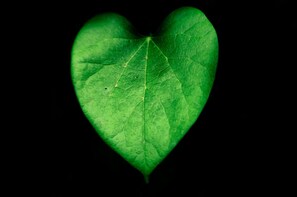 green heart image by Adithya Vinod on Unsplash
green heart image by Adithya Vinod on Unsplash
 green heart image by Adithya Vinod on Unsplash green heart image by Adithya Vinod on Unsplash Let us think about three things – about greenery, about the Sydney GreenWay, and about Hildegard’s Latin word ‘viriditas’, meaning greenness or verdancy, that informed out recent entry in the Mardi Gras parade. And let’s keep in the back of our minds a couple of questions – what connects Jesus’s entry into Jerusalem with Extinction Rebellion? Ad what might Hildegard and the GreenWay have to say to the vibrancy and future of the church in our own time?...
0 Comments
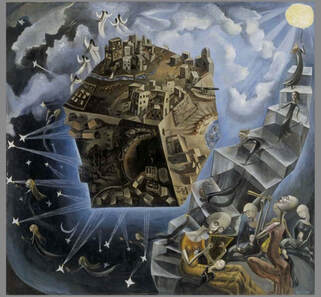 Un Mundo, by Ángeles Santo, Museo Reina Sofia Un Mundo, by Ángeles Santo, Museo Reina Sofia What value does the book of Revelation have for us, especially in the face of ecological crises? My guess is that most of us have not spent too much time on the Bible’s last book. Some people of course have, including those looking for a special secret code to life and history, and those puzzling out different timetables for Christ’s second coming. Such interpreters however typically have little concern for ecology, and some even welcome signs of environmental apocalypse. Faced by the strangeness of John the Divine’s visions, we may therefore be tempted to dispense with the book altogether. Yet that would be a mistake. For, as this morning’s reading (ch.12 vv. 1-9 & 13-17a) illustrates, truth and light can be received in the strangest places… 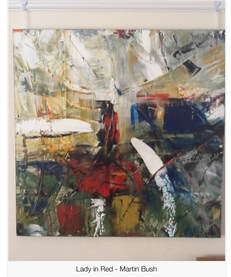 Maybe what she wanted to do was punch Him (God) But she couldn’t So Sarah laughed Didn't Suzanne Terry put it well in her poem 'Sarah Laughed'? How many of us have wanted to punch God, or worse, for what has happened, or not happened, to ourselves and others? In Genesis chapter 18, Sarah laughs out of her deep experiences of sorrow, anger, and utter frustration, with God. After all she has experienced, as a childless migrant woman, in an ancient patriarchal culture where child-bearing was so important, how dare God turn up and now declare fresh hope. Why take so long to give this gift? Why put Sarah through such trials? We can easily identify. As elsewhere in the Bible, we are not presented with a simple moral or spiritual inspiration. Rather we encounter a very human struggle, with which we are invited to wrestle. Suzanne Terry’s poem is a product of this. For she was responding to a book entitled Those Who Wait: Finding God in Disappointment, Doubt and Delay. This, like other writings by Tanya Marlow, seeks to explore how we live with the realities of suffering…  photo: by Ashin K Surash on Unsplash photo: by Ashin K Surash on Unsplash Today’s reading from Luke begins with the often-repeated phrase ‘don’t be afraid’. It is a phrase so often repeated that it has given me pause for thought this week. Do the Scriptures encourage us all the time not to be afraid, precisely because the people for whom they were written were in fact constantly afraid? They would have had good reason to be. As far as we can tell most early followers of Jesus were subject peoples living in occupied territory. The might of Rome was a constant threat, taxes were high, financial insecurity inevitable, and it was not as though they had the securities of modern medicine, analgesics, and antibiotics. Moreover, the expectation of Christ’s imminent return, coupled with an increasing impatience at its delay sounds an anxious apocalyptic note throughout the pages of the New Testament. But what about ourselves? Are we also afraid? Religion has after all for centuries traded in fear – fear of God’s punishment and condemnation, sweetened by the promise of salvation for those who truly believe, (some have called that ‘pie in the sky when you die’); treasures in heaven beyond the reach of moth, rust, and thieves – and after the last few months in Sydney I’d want to add mould! So, are we also afraid? This is an important question as we enter a period of considering our mission as a congregation. If we are afraid, what are we afraid of? – remembering that fear is not all bad. It is a great motivator to action. But the encouragement of the gospel is not to be afraid, but to act from a different place – a place where we don’t have supposed ‘treasures’ to defend; a place where we are set free from the need to control and secure; a place indeed as the letter to the Hebrews calls it, of faith... 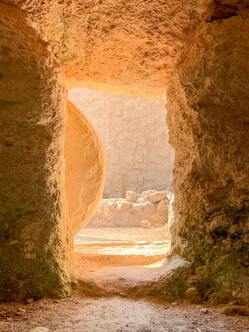 image: Psit Heng on Unsplash image: Psit Heng on Unsplash “Early on the first day of the week, while it was still dark, Mary Magdalene came to the tomb” I want to teach any children here today a special and perhaps unfamiliar word – the word is ‘liminal’. Any ideas what it means?... I checked the dictionary, and it means, “occupying a position at, or on both sides of, a boundary or threshold”. Let me show you what that means. If you come forward here and put one foot on the step of the platform here at the front, and keep one foot on the floor, then you are standing on the threshold – right on the boundary – not on the platform, and not still on the floor either. You are in the liminal place... 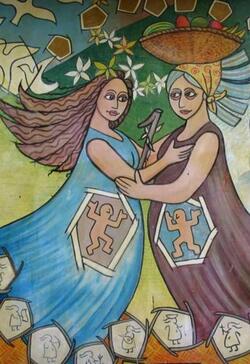 Visitación, detail from mural at Casa Ave Maria in Managua, Nicaragua Visitación, detail from mural at Casa Ave Maria in Managua, Nicaragua How do you relate to Mary in our Christian tradition? Even mentioning her name opens up a host of feelings and thoughts for so many. As the Danish literary historian Pil Dahlerup rightly said, in an article entitled ‘Rejoice, Mary’: No woman and no deity in the Middle Ages attracted the poets like the Virgin Mary, mother of Christ. It is, however, hard to read what the poets write about Mary; we are inhibited by prejudices that block our understanding of what the texts are actually saying. Protestants dislike her because she is attributed divinity. Male chauvinists dislike her because she is a woman. Feminists dislike her because she is a woman in a way of which they disapprove. Nationalists dislike her because she represents an alien element in terms of creed and idiom. Marxists dislike her because they do not see her (in the North) as a figure of the people… Despite this, we cannot avoid Mary in Christian faith. Not least, although women and their lives and gifts are so few and highly gendered in the Bible, Mary simply cannot be erased. So what do we make of her today?...  Growing up, even as a little child I was fascinated by what was then known as the English Civil War (although, to be accurate historically, this is now rightly recognised as several different wars across the islands of Britain and Ireland). It was a bitter and brutal period, culminating in the judicial trial and execution of the King. For this was a powerful revolution. Indeed it saw the establishment of a republic, the Commonwealth and Protectorate under Oliver Cromwell. Moreover, in that latter period there was also an extraordinary flowering of truly radical religious and political life and thought. That, I think, was what especially drew me into the study of history. For the origin of many liberal democratic things we take for granted lie there – for example, the insistence on no taxation or legislation without representation, on regular elections, fixed parliamentary terms, equal votes, and, vitally, on religious freedom for different types of groups, particularly the marginalised. Indeed, Cromwell even reopened England to the Jews, who had been banned for centuries. For his supporters were also part of the movements which helped create Congregationalism, the original founding tradition of Pitt Street Uniting Church... 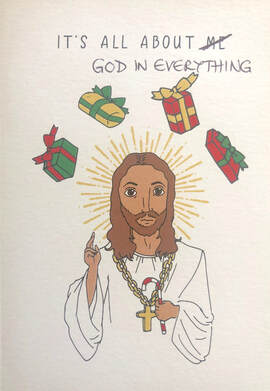 One of the Christmas cards that struck my eye this year was one that has a picture of a Jesus figure on the front, accompanied by presents around their head, and the proclamation ‘It’s All About Me’. What do you think about that? I suspect that it is a gentle way of poking fun at both the tendency of some Christians to be somewhat sanctimonious about ‘possession’ of our end of year communal festivities, and also the way in which we often want Christmas to meet our own expectations. This often begins as children - doesn’t it? – when we human beings don’t quite receive the magical Christmas for which we were hoping: maybe when we don’t have quite the special present we were expecting; and/or when our Christmas meal, or worship, isn’t quite right, or too much; or when we, or others around us, aren’t able to maintain the proverbial spirit of peace and goodwill in all our interactions. Sometimes our expectations are just too much, or too unrealistic. Sometimes they are quite right, and we are let down by events or by others. Either way, we may feel a little betrayed, especially if hopes for ourselves are involved. Perhaps however, in the disappointments of our personal Christmases, we may still learn a little of the wisdom in the birth of Christ. Fresh light may then stream in, particularly when we start looking beyond ourselves – not simply to the Christ child, but to everything about them. This may be part of the learning of this Covid-19 year, in which many Christmases are not as the world as a whole would hope. For, like the first Christmas, pictured in various ways in the Gospels, we have had to learn that it is not ‘All About Me’. If God is among us – the central message of Christmas – then he/she/they are everywhere, but not as we expected, and all of us are, truly, ‘in this together’…  A few weeks ago I invited us all to address the question of Jesus: ‘who do you say that I am?’ This is central to the Christian spiritual pathway. As I affirmed, the answers to that question will differ, as they have differed, subtly or significantly, down the centuries. Today, on St Luke’s Day, Penny and I want to ask three more questions, which also feed into our community visioning day. They seek to open up three important areas of life: firstly, healing; secondly, hospitality; and thirdly, how do we hand on hope, as we experience it in our spiritual lives. Penny and I will do this together as a conversation. For, after all, isn’t one of the most beautiful stories in Luke’s Gospel that of the conversation between the disciples on the road to Emmaus, as they rediscover the living Christ in new ways? Before all that however, I want to ask Penny about our relationship to St Luke. For we’ve had a bit of history with St Luke, haven’t we?... The Transfiguration - as Joseph Pagano has described it “three holy heavyweights hold a summit meeting on the ways God will fulfil God’s promises through the death, resurrection and glorification of Jesus”. It is not heralded with the pomp and ceremony of Trump meeting Kim Jong Un. But the outcomes are life changing for all of us. Peter, James and John nearly sleep through it all – a foreshadowing of course of their inability to stay awake in the garden of Gethsemane. Whether it is the glory of God or the agony, the joy or the pain, we mere humans are inclined to choose sleep over wakefulness, because being awake asks so much. But never perhaps in the church’s history has it been so imperative that we keep awake to what God is doing and to refuse to shut god up in boxes and booths of our own making... |
Authors
sermons and reflections from Penny Jones & Josephine Inkpin, a same gender married Anglican clergy couple serving with the Uniting Church in Sydney Archives
June 2024
Categories
All
|
 RSS Feed
RSS Feed